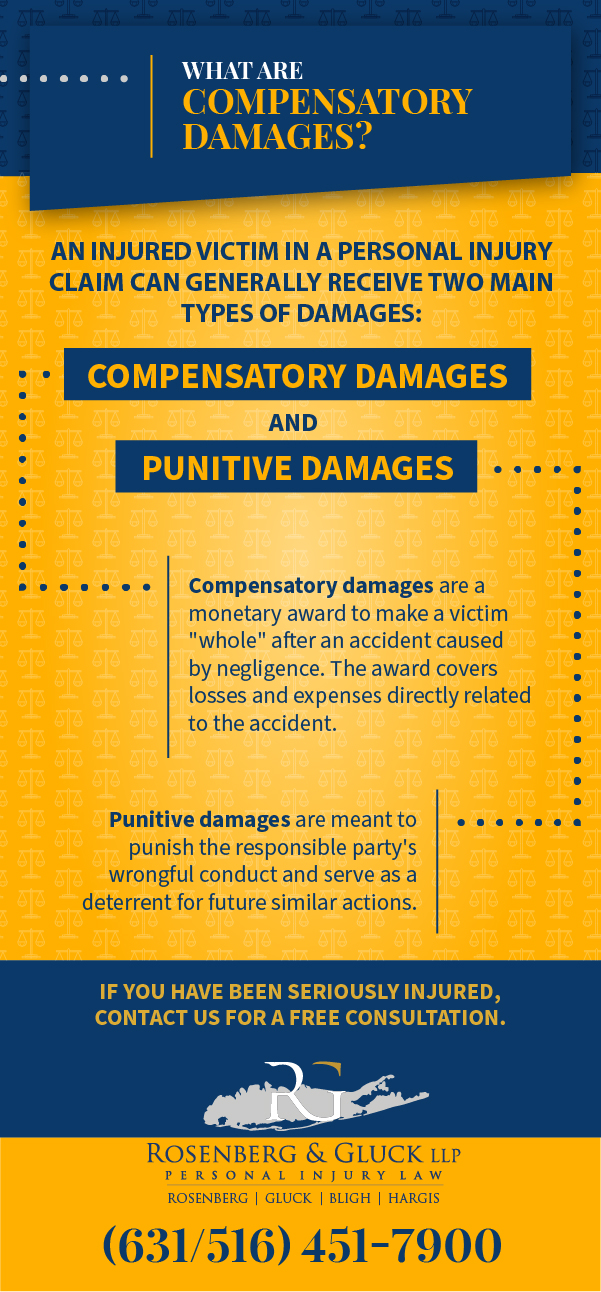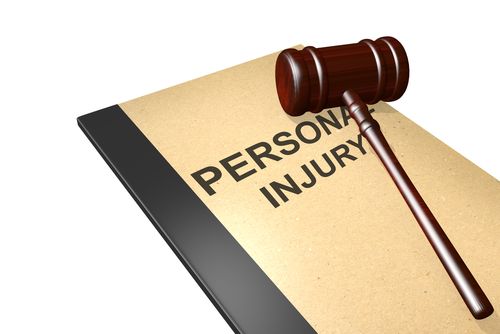
Call today to speak about what compensatory damages you might be entitled to after a personal injury accident.
An injured victim in a personal injury claim can generally receive two main types of damages: compensatory and punitive damages. Compensatory damages or actual damages are a monetary award to make a victim “whole” after an accident caused by negligence. The award covers losses and expenses directly related to the accident.
Although not very common, occasionally a negligent party may also have to pay punitive damages. Punitive or exemplary damages are meant to punish the responsible party’s wrongful conduct and serve as a deterrent for future similar actions.
If you or a loved one experience a personal injury or other loss due to someone else’s negligent behavior, call today to speak with a Long Island personal injury lawyer on our team who can explain how tort law impacts the compensatory damages or punitive damages you may be eligible to seek.
For a free legal consultation, call 516-451-7900
The Purpose of Compensatory Damages
The purpose of compensatory damages in personal injury claims is to cover all expenses and losses incurred as a direct result of the incident, including medical bills, property damage, lost wages, emotional distress, pain and suffering, and more. In some cases, monetary compensation may also be awarded for future medical expenses or loss of future earning capacity because of the injury suffered.
Click to contact our personal injury lawyers today
Types of Compensatory Damages You Can Recover

Below is a list of actual damages an injured party can recover from personal injury cases. These can be either economic damages or non-economic damages.
Medical Expenses
In a civil lawsuit, an injured individual has the right to seek compensation for all medical expenses incurred as a result of someone’s negligence, such as:
- Hospital stays
- Rehabilitation
- Prescription medication
- Medical devices
- Ongoing care
- Surgeries
- Physical therapy
Lost Income
An injury victim may need to use sick days, vacation days, or accrued paid time off during recovery. Therefore, they can sue for wages and benefits lost during recovery from an injury caused by someone’s negligence.
If the injuries sustained prevent the victim from working in the future, they can sue for lost future earnings.
Property Damage
If someone’s negligence caused damage to a victim’s personal property, they can sue for the cost of repairing or replacing that property. For example, a victim in a car accident case may secure compensation that covers their vehicle repairs or pays for a new car.
Pain and Suffering
The amount of pain and suffering compensation a victim receives generally reflects their medical expenses, future prognosis, and testimony from expert witnesses.
For example, a broken arm may prevent a person from working, require surgery, and take several months to heal. This will likely result in a reasonably large amount of pain and suffering compensation. However, if a limb is severed, the combination of physical pain and psychological distress resulting from such a catastrophic injury would likely lead to a more substantial recovery for pain and suffering.
Wrongful Death Damages
You can also recover compensatory damages if you lost a loved one in an accident due to a negligent wrongful act. Compensatory damages in a wrongful death case might include, but are not limited to:
- Funeral expenses
- Burial plot
- Embalming
- Your loved one’s medical bills
- Your loss of support and companionship
Complete a Free Case Evaluation form now
What to Watch Out for When Calculating Damages
Before agreeing to a settlement that includes releasing the negligent party from any future liability, it is crucial for you to seek a consultation with an attorney from our firm.
Typically, when a victim agrees to a settlement, it bars them from pursuing further legal action against that responsible party for the same claim. It’s important to exercise caution when accepting a settlement prematurely, as there may be unforeseen medical expenses as part of your recovery.
Adhering to the Statute of Limitations
You only have a certain amount of time to file a personal injury lawsuit and recover compensatory damages.
- CVP §214 permits three years to file for personal injury.
- EPT §5-4.1 allows claimants two years to file for wrongful death.
- CVP214-A gives those hurt by medical malpractice two years and six months to file.
Failure to abide by these deadlines could result in the State of New York declaring your case null and void. This is why it’s important to consult with an attorney as soon as possible after an accident. Remember, it is important to consult with a lawyer as soon as possible as there may be circumstances, such as when suing a municipality, that significantly reduces the time you have to act.
Connect with Rosenberg & Gluck, L.L.P., Today
Each personal injury case is unique and results in different types of compensation. If you or a loved one has recently sustained injuries as a result of another party’s negligence and are uncertain about what compensation may be accessible to you, we encourage you to reach out to Rosenberg & Gluck, L.L.P. today for a complimentary, no-obligation consultation.
We also work on a contingency-fee basis, which means you don’t pay us any attorney fees until we secure compensation for you.








